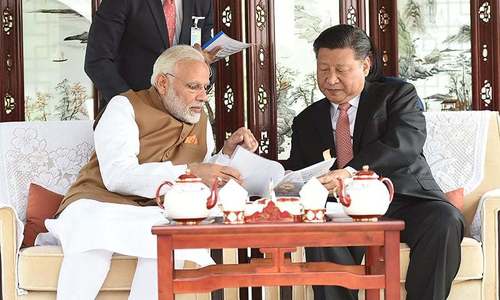Pakistan and China reaffirmed their resolve to further strengthen their bilateral strategic partnership, a joint statement issued after the conclusion of Prime Minister Imran Khan's two-day visit to Beijing said on Wednesday.
The prime minister visited China at the invitation of Chinese Premier Li Keqiang starting on Tuesday.
During the visit, the premier called on Chinese President Xi Jinping, Premier Li and National People’s Congress Standing Committee Chairman Li Zhanshu. He also met Chinese entrepreneurs and businessmen.
The prime minister attended the closing ceremony of the Beijing Horticulture Expo 2019 as the chief guest. He congratulated the Chinese leadership and people on the 70th foundation anniversary of the People’s Republic of China.
He felicitated China for its remarkable growth and underscored that the reform and opening-up process of China was a model for developing countries.
The two sides reaffirmed their support on issues concerning each other’s core interests. Chinese leaders expressed solidarity with Pakistan in safeguarding its territorial sovereignty, independence and security. The Pakistan side reaffirmed its commitment to the One China Policy.
"Supporting One Country Two Systems, Pakistan reiterated that affairs of Hong Kong were China’s internal matter and all countries should uphold international law and basic norms of non-interference in internal affairs of other countries," the joint press release read.
The Pakistani side briefed the Chinese side on the situation in Indian-occupied Kashmir. The Chinese side responded that it was "paying close attention" to the current situation in occupied Kashmir and reiterated that the issue is a dispute left from history, and should be peacefully resolved based on the UN Charter, relevant UN Security Council resolutions and bilateral agreements.
"China opposes any unilateral actions that complicate the situation," the statement said, adding that the two sides underlined that a peaceful, stable and prosperous South Asia was in the common interest of all parties.
CPEC, bilateral cooperation
Both sides maintained that the second phase of the China-Pakistan Economic Corridor (CPEC) will promote industrial and socio-economic development in Pakistan. The Pakistani delegation highlighted that the Gwadar Port has been granted various facilities enabling it to become a trade and logistical hub for the region.
"The two sides expressed determination to speedily execute CPEC so that its growth potential can be fully realised making it a high-quality demonstration project for the Belt and Road Initiative," according to the statement.
Both sides agreed to jointly study identified projects in power, petroleum, gas, agriculture, industrial and infrastructure sectors. Those projects were entrusted to the concerned Joint Working Groups for deliberation and subsequent consideration by the Joint Coordination Committee (JCC).
The two sides held in-depth exchange of views on deepening bilateral cooperation in the areas of trade, investment, finance, defence and security, education, agriculture, social sector, people-to-people contacts and cultural linkages.
They agreed that early implementation of the second phase of the China-Pakistan Free Trade Agreement would contribute to an increase in bilateral trade.
During the visit, Prime Minister Imran and Chinese Premier Li witnessed the signing of various agreements and MoUs.
Prime Minister Imran thanked the Chinese leadership for providing opportunities to Pakistani students to study in China.
The leaders reviewed the bilateral defence cooperation and agreed to further strengthen this in the areas of military exercises, training cooperation, personnel exchanges, and equipment and technology cooperation.
Reaffirming that there is no military solution in Afghanistan, the two sides agreed that peace and stability in Afghanistan is vital for regional security and expressed satisfaction at the outcomes of the third China-Afghanistan-Pakistan Foreign Ministers' Dialogue held in Islamabad on September 7.
The Chinese side appreciated Pakistan’s efforts in promoting peace and reconciliation process in Afghanistan. "Both sides maintained that an inclusive, and Afghan-led and Afghan-owned peace process would be key to bring peace and stability in the country," the press release said.
Both sides reiterated their commitment to fight terrorism in all its forms and manifestations, with China calling on the international community to "objectively recognise Pakistan’s contributions to regional peace and security through its success in [the] fight against terrorism".
Prime Minister Imran thanked the leadership and people of China for their hospitality, and invited the Chinese leadership to visit Pakistan at a mutually convenient time.














































